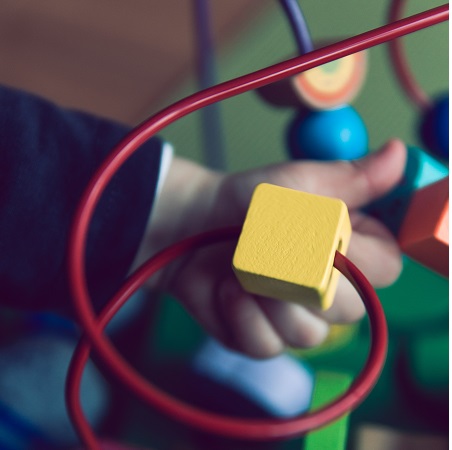Approved training videos related to the assessment of young children.
Assessment of Young Children
This video provides a guide to the use of The Ages & Stages Questionnaires: Social-Emotional (ASQ:SE-2), an overview of emotional and social development and provides an inside look at the screening sytem in practice with a home visitor using the tool with the family of a 4-year old boy.
Teachers and education coordinators demonstrate the system they use to collate the observational data on young children. A variety of portfolio systems are explored. Teachers demonstrate the linkage between the formative assessment system they are using and how that data informs the formal assessment or checklist.
This video explores a variety of authentic assessment techniques used in preschool settings to document the growth of young children in their classrooms, including observations, work samples, and more.
This module emphasizes the importance of communicating with and respecting parents throughout the assessment process. A variety of progress reports designed for parents by the authors of different curriculum models are highlighted.
This module sets the stage for understanding how children are observed within the context of their play as well as their culture and how these observations are important to understanding their total development.The validity of Authentic Assessment techniques to chart children’s growth and development versus the use of standardized testing is discussed. Children are observed within the context of their play as well as their culture.
This video discusses the signs of Autism in infants & toddlers, the roles parents play in their child’s development, the diagnosis process, and talking with parents in certain scenarios. Video clips of children with Autism are also shown.
This Apples Magazine shows teams discussing children’s functioning in three outcome areas: 1. having positive social emotional skills, 2. acquiring and using knowledge and skills, and 3. taking appropriate action to meet one’s needs. These are the functional outcomes State Early Intervention and Early Childhood Special Education Preschool Programs must measure and report to the U.S. Department of Education, Office of Special Education Programs. The participant will view three team discussions, each featuring a different child, team, and outcome. All the teams shown on the video include parents. Discussion questions are provided at the end of each outcome discussion to help you think critically about what you have observed.
This Apples Magazine features Brian Michalski and Gay Grounlund. Observation and documentation is a way for teachers to learn about their children and document each child’s progress over time. Discover ways to use various technologies to improve observation, documentation, assessment, and instructional practices.
This video explains how information gained through ethnographic interviewing – asking the right questions to the right person in the right way – can enable you to design assessments and interventions to meet clients’ needs and goals.
Offers practical ideas and insights from professionals in the field of early care and education who speak with the perspective that can only come from years of working with directors, teachers, young children, and their families. Interlaced with real-life classroom video, they provide a platform for staff development and training sessions.

The videos are assigned to a designated core content area.
Continuing Education via Video-Based Training
Since April 2006, a maximum of 5 hours of EI credit via videos may be used for every 30 hours of continuing education submitted for renewal and/or core knowledge area documentation purposes for early intervention professionals. The EI Clearinghouse has worked with the Early Intervention Training Program to identify videos available from the EI Clearinghouse lending library that have been approved for EI credit hours. While providers cannot use video-based training for all of the required training hours, they can apply for credit for at least some of the required hours. Several of these videos can be viewed online.
How Credit Hours are Determined
Video-based credits are based on contact time, so a half-hour video would equal a half hour of credit, a one-hour video would equal one hour of credit, etc. Each video viewed requires the completion of an EI Training Video Credit Request Form, which is to be sent to the EI Training Program when completed. After your information is reviewed and approved, you will receive a Certificate of Credit indicating that you have earned contact hours equal to the video running time (to the nearest quarter hour) to apply toward your EI credential. Please contact the Early Intervention Training Program for more information.
How to order videos
- Please use our Online Request Form for questions and material requests.
- Materials check out for 4 weeks
- You may check out up to 5 items at a time.
- You may request to renew items 2 times (as long as there is not another request for that item).
- You will receive information with the books or videos on options for returning the materials.
